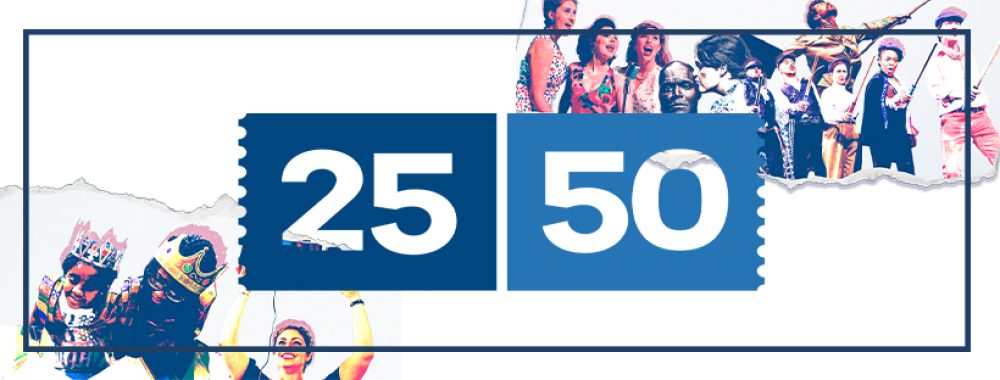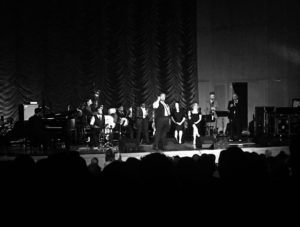Week Thirteen: DePauw University, Greencastle, Indiana
By Kaffe Keating
“Would you have a love song, or a song of good life?”
– Feste, Act 2 Scene 3
Small town America. After the buzz and bustle of Silicon Valley, we couldn’t be somewhere more different. DePauw University is situated in the town of Greencastle, about a 45 minute drive from the state capital of Indianapolis. It’s small, and it’s very pretty – both the town and the college.
It’s getting to the point now where we all need haircuts. Al’s beard is now so long and thick that he’s had to go and buy some frankincense-infused beard oil. Jono, who’s let his hair grow out since day one of rehearsals (and who is capable of producing an enviable mane) went and got a trim on our first full day in Greencastle.
“You’ll never guess what his name was,” he grins from under his slightly neater but still sweeping fringe. “Sweeney. Frank Sweeney. He even used a cut-throat razor.”
I’ve been wanting a haircut for ages but just haven’t found the time. When my hair gets too long it starts to sprout out at the sides, rendering me with a look more befitting of Doc Brown than Orsino, Duke of Illyria. So the following day I head off into Greencastle to seek the services of the Demon Barber of Indianapolis Street myself.
The barbershop is a pretty simple affair, a line of mirrors down one side of the room with the classic revolving chairs, sat in one of which is a man in his late sixties or early seventies. There’s also a full-size canoe mounted on the wall.
“You need a haircut?” the man asks. I respond in the affirmative. “Well,” he says, lifting himself out of the seat and offering it to me, “we have them here.” I take my jacket off and sit down, and we get to chatting. His name is Wayne – Frank Sweeney isn’t working today (I’m oddly relieved) – and after hearing my accent he asks if I’m Australian, which is a mistake that occurs more often than you’d think. I reveal my English heritage and talk turns to visiting Europe. He tells me that he spent six months in Germany and Austria as part of the Marine Corps, and I tell him how we’d recently visited USNA in Annapolis.
“Ah, it’s pretty there.” He croons, over the chugging of a pair of clippers which I suspect have seen better days. It turns out that after his time in Europe, he was stationed in Vietnam for a year and a half. There’s a beat. I’m doing maths in my head.
“That must have been difficult.” He nods. He was there in 1968, during the Tet Offensive. I
remember learning about it in History GCSE. It was a series of surprise attacks by the Vietcong and North Vietnamese army on many cities, towns and villages in South Vietnam and is thought by many to be a turning point in the war. It must have been a horrific thing to experience. I don’t push Wayne any further on the subject.
“There’s a student who comes in here, Tan,” he says. “He’s from Vietnam. From Da Nang. Now I haven’t been there since 1968, and I was there for a different reason than cutting hair. But apparently it’s very different now. It’s like an American city, at least that’s what he says.” The irony hangs in the air.
The bell above the door rings in the entrance of another customer, I’m guessing in his fifties and powerfully built, after a haircut of his own. “Hello there, young man,” says Wayne. “This is Roy. He’s a good old boy, he’s an ex-marine too.”
The three of us talk for a while. Roy, after his time in the Marines then transferred to the Army. After learning of the bitter rivalry (at least when it comes to football) between the two services at the Naval Academy, I remark that that must have been an interesting change.
“Oh, we’re just the bastard son of the Navy,” says Wayne.
“They’re our taxi-cab!” adds Roy.
The three of us chat away over the buzz of Wayne’s clippers, (my previous concern completely evaporated; the man certainly knows how to cut a short back and sides) and I tell them about where we’ve been so far and where we’re going to. I’m told Colorado Springs is lovely, but apparently Denver has become a ‘pothead city’ since the state legalised cannabis. Wayne tells me of a friend of his who works in Silicon Valley and hates it. We talk about Austin, and what a great city it is. I also learn a surprising amount about carp fishing. Roy’s an avid carp fisherman, there are competitions apparently, and he thanks me on behalf of all Americans for the British system of fishing for carp by setting alarms and just waiting for them to go off. I know precisely nothing about fishing, but I accept his thanks on behalf of my people all the same.
Wayne’s taking off my apron. “That’s twelve bucks,” he says.
“Sure thing. Do you take card?” I ask, a Londoner through and through.
“No, we don’t have a card machine here.”
Ah. I’m concocting a plan wherein I can leave Wayne my phone or something as collateral while I run off into Greencastle to find an ATM, when Roy gets out of his chair.
“I’ve gotcha.” He says, smiling down at me as he pulls out his wallet.
I protest wildly, but Roy’s having none of it. He presses the notes into Wayne’s hand, who’s perfectly happy with the arrangement. “American hospitality.” I sense that any further argument from me would now become ingratitude, so I thank them both and retrieve my jacket from the hook.
I tell Roy that if I see him around, I’ll buy him a beer (“He’s a marine, he’ll hold you to that,” calls
Wayne) and I leave the barbershop. The kindness of strangers.
And that’s the story of how a Marine bought me a haircut. It’s not the only random act of kindness that occurred this week. Jono, an intrepid explorer to the end, after walking so far away from our hotel that he wouldn’t be able to get back in time before dark approached two strangers in a parking lot. They happened to be heading not only the same direction as him, but to the hotel itself and offered him a ride. Not only that, but once they got arrived, they insisted on buying him a beer.
People are just incredibly friendly in this state. We found this last time we were here at the very beginning of the tour but now, closer to the end, I have much more to compare it to. It’s completely lovely and something I will miss dearly upon my return to London; we Londoners pride ourselves on our devotion to the avoidance of human eye contact.
On Saturday night, after the week’s teaching and performing was done, we were treated to tickets to see Post Modern Jukebox who were passing through on their national tour. Post Modern Jukebox are a band (whose total membership boasts over fifty different musicians) who perform covers of well-known songs with a jazzy or bluesy twist. They’re excellent; have a gander on YouTube. Just stick it on in the background while you read this.
The first half is great. The band are clearly exceptional musicians and the each of the singers could melt chocolate by singing at it. While we’re waiting for the band to come back after their break, the lights in the auditorium in all go off at once and the interval music dies. We’re now sitting under the stark half-light of emergency lighting, powered by the back-up generator. People in black t-shirts and headsets start running around, always a sign that something’s gone wrong. Performances are like flights; you don’t need to worry until the crew starts to look worried.
We wait. The time when the show should have restarted comes and goes. People are moving things around on the stage. Are they packing up? Is that it? Are they going to tell us anything? It seems like the evening is over when the big electric piano the band was using is wheeled off. I guess they’re giving up the ghost, how can they continue while the power’s out?
But, hang on. They’re wheeling on a grand piano from the wings. An announcement is made, the band are going to perform an acoustic set for the second half. The singers are more than skilled enough to fill a room this size unamplified, especially as the band are trading their electric instruments for quieter, acoustic ones.
They finish off the set like this, a pared-down but no less spectacular version of their show bathed in the light from the phone torches held up by the audience.
It makes me wonder what we’d do if that happened to us. Probably something similar, we’ve got a couple of torches in the show, we’re already contained in a square of fairy lights, we’d figure it out. As Post Modern Jukebox’s MC said as they began their unplanned unplugged second half: The show must go on.
And go on we do, three hours upstate to Grace College in Warsaw Indiana. Our penultimate week. The days of staring at my shoes on the tube, valiantly ignoring anyone I remotely come into contact with, are creeping ever closer…

